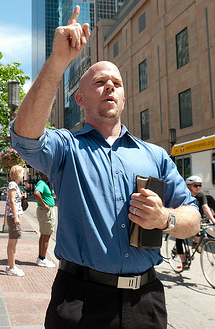 I was headed to a movie at a cinema downtown the other night, and I walked by a street preacher who was shouting Bible verses and sketchy theology at passersby.
I was headed to a movie at a cinema downtown the other night, and I walked by a street preacher who was shouting Bible verses and sketchy theology at passersby.
I went to high school and college in southern Missouri, so I’m familiar with street preaching. However, if you have never seen a real, live street preacher, you know just what I mean by the term. And you probably don’t have a high opinion of the practice.
Catholics on the street?
Yet if you have been paying attention to the modern papacy, you could get the impression that Catholics are supposed to be out on the streets on Saturday night, attempting to engage people who are out on the town.
- “Jesus doesn’t tell the Apostles and us to form an exclusive group of elite members. Jesus says: ‘Go and make disciples of all nations’.” —Pope Francis
- “The Church is missionary by nature and her principal task is evangelization.” —Pope Benedict XVI
- “No believer in Christ, no institution of the Church can avoid this supreme duty: to proclaim Christ to all peoples.” —Pope John Paul II
- The Church “exists in order to evangelize.” —Pope Paul VI
It’s that last one that gets me. Pope Paul said that in 1976—the year I graduated from high school and in the middle of the time I was getting “evangelized” regularly by enthusiastic Baptists and Pentecostals. I was a pretty good Catholic when I was young, but not so good that I was reading papal encyclicals. I had no idea Catholics were supposed to evangelize.
If you’re joyful, inform your face
Some of the Bible-quoting kids in my high school did eventually have an impact on me. I never did understand their simple formula for salvation (“Do you know Jesus as your personal Lord and Savior?”). Nor did I see the need to memorize extensive passages from Scripture to be used as self-evident proofs of whatever point they were trying to make at the moment (“John 3:16!”). But I was attracted to their pure, simple belief and the joy it gave them. I had no idea Catholics were supposed to be joyful, either.
It was that experience of sharing faith with other kids in my high school—and the joy it gave me—that opened my eyes to what it means to be a Christian.
At the time, however, evangelization, faith sharing, joy in the Lord—these were not exactly touchstones of Catholic culture. The Catholics of my generation were good at talking about the faith, which is really quite different than sharing my faith. It is still that way with so many Catholics in so many parishes. That is why pope after pope after pope feels compelled to talk about evangelization. If we were all doing it, they wouldn’t need to be reminding us to do it. Difficult as this is, however, it is no surprise.
Evangelization is not a field of study
Here is what is a surprise, at least to me. The longer I am in this ministry, the more I realize it is not just the folks in the pews who have difficulty sharing their faith and evangelizing others. Many of our volunteer catechists and RCIA team members have difficulty with this. Many folks who have studied and taught theology cannot easily tell you a story about their own faith journey.
And lots and lots of priests and deacons are way more comfortable preaching about the gospel than preaching the gospel, which again is a very big distinction. I become even more dismayed when I read books or listen to talks by “experts” in the field of evangelization who think that evangelization is some kind of “field” that you become an expert in.
How to catechize without catechizing
I recently met a woman who kept telling me she was not a catechist. She was in sales for her entire career, and she told me she has no training in catechesis. But she has a deep love for Jesus and a real joy in her faith. She has been volunteering on her RCIA team for more than 20 years, sharing her faith with anyone who will sit with her for more than 30 seconds. She is not out on the street, shouting Bible verses. I doubt she has ever memorized a Bible verse.
But she can tell a catechumen the story of the woman at the well in a way that will make you cry. Because in lots of ways, it is her story too. I know it’s her story too because she has told me—and the catechumens, and the seekers, and the candidates, and the clergy, and anybody who will listen—about the deaths and the resurrections in her life and how she has never been without hope.
Please share your story
We have to do this. We all have to do this. It is the reason the church exists. We have to stop whatever else it is we are doing and start doing this. If you have been doing this—sharing your story of your faith in a way that helps others believe they can have the same joy you have—please share with the rest of us how you got started and how we can get better at it.
A suggestion from the pope
If you have trouble doing this and don’t know where to start, I’m going to offer you a suggestion from Pope Francis. If you can do this one thing, I promise you will feel overwhelmed with the love of the Lord. And perhaps you will feel compelled to share that love with everyone you meet.
We must ask the Lord to help us understand this law of love. How beautiful it is to love one another as true brothers and sisters. Let’s do this today. Maybe we all have the people we like and [those we] dislike. Perhaps many of us are a little upset with someone. So let’s say to the Lord: “Lord, I am angry with this person or that one. I will pray to you for him and for her.” Praying for those we are angry with is a good step in this law of love. Shall we do it? Let’s do it today! (Pope Francis, June 12 at the Vatican, addressing a general audience on the concept of The People of God)


















Yes it is true we should have our faith journey story ready and ready to give it at all times. I have been actively evangelizing all who would sit with me “for more than 30 seconds.” as a matter of routine. I have done a little door to door and some street evangelization (not by flinging bible versus, but by making myself available to those who have questions and my story is often intermixed with good solid catechesis). When it comes to evangelizing this culture we cannot limit ourselves to one specific method. It is also extremely helpful to actually know your faith well and apologetics is a good way to explore the many questions you will have to eventually be able to answer.
Good article, but your faith witness is just the very beginning of evangelizing.
For a great article on “Catholics in the Streets” check this out; http://wau.org/resources/article/re_soapbox_catholics/
Everybody loves a good story. We base our catechetical structure in RCIA on what we call the Catholic Family Story. It is summarized in Eph 1:1-23 and CCC #1. We tell the story early in the Precat in a low key non-theological manner, from creation to the present. This is Gods plan of sheer goodness. The Catechist can then tell their story and elicit the stories of the candidates. This is the Father’s story for us, it is my story, it is your story. As the process progresses to unfold the truths of the faith we always relate back to the Story.